LATE on Tuesday, Economic Freedom Fighters (EFF) leader Julius Malema tweeted: "Any settlement should reaffirm the powers of the public protector. We should all agree first that remedial actions of the PP are binding."
Mr Malema was referring to the Presidency’s surprise announcement earlier that evening of a proposed way forward in the protracted legal dispute over Public Protector Thuli Madonsela’s Secure In Comfort report into the upgrades to President Jacob Zuma’s private homestead in Nkandla.
A letter from the state attorney’s office, filed in the Constitutional Court on behalf of the president on Tuesday, spoke of "the need for finality".
It proposed that Mr Zuma would pay a percentage of the cost of nonsecurity-related upgrades in Nkandla and this would be determined by the auditor-general and a Treasury official.
The announcement came on the eve of the hearing date and after a lengthy, bitter fight in Parliament over paying back the money. The Nkandla cases are scheduled for next Tuesday, two days before Mr Zuma is due to deliver the state of the nation address.
Mr Malema’s tweet puts its finger on another crucial aspect of the court cases. They were expected to bring much-needed clarity to an ongoing dispute about the role of the public protector in SA’s constitutional democracy.
If the president’s proposal of an "order by agreement" were to be accepted, some of the answers to important legal questions about the public protector’s role would have to wait for another day.
The letter from the state attorney attempts to tackle this.
It says "the exact nature and ambit of the public protector’s remit" is pending before the Constitutional Court in another case concerning Ms Madonsela’s When Governance and Ethics Fail report, dealing with alleged maladministration and abuse of power at the South African Broadcasting Corporation (SABC).
The SABC case is scheduled to be heard next month.
It is true that when the Constitutional Court hears the SABC case, it will most likely have to give content to the meaning of the public protector’s power to "take appropriate remedial action".
Another key question that could be settled in the SABC case is around "parallel processes" — whether once the public protector has spoken, she can be second-guessed by another investigation.
But these are not the only important questions it was hoped the Constitutional Court would answer. The Nkandla cases — one brought by the EFF and the other by the Democratic Alliance (DA) — deal with more questions.
The EFF’s case is expressly not about whether the public protector’s directives are binding. Its focus is on the president and Parliament, and their constitutional obligations when confronted with findings and remedial action taken by the public protector.
The EFF argues that in terms of the Constitution, the president and Parliament have "unique and heightened" duties compared with ordinary public officials and other organs of state.
The duties of the president and Parliament towards a public protector’s report may go further than those of SABC chief operating officer Hlaudi Motsoeneng’s.
The DA has indicated it will press ahead with its argument and has not been tempted by the president’s "settlement" offer.
A similar statement is expected from the EFF.
However, it has happened before that on the morning a case is meant to be heard, proceedings before the Constitutional Court have been stood down for the lawyers to haggle out some kind of settlement.
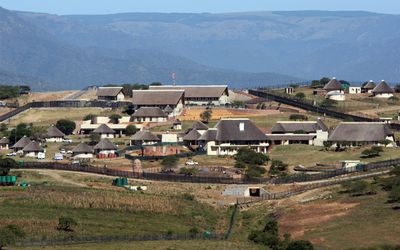
President Jacob Zuma's residence in Nkandla. Picture: SOWETAN/SUNDAY WORLD
LATE on Tuesday, Economic Freedom Fighters (EFF) leader Julius Malema tweeted: "Any settlement should reaffirm the powers of the public protector. We should all agree first that remedial actions of the PP are binding."
Mr Malema was referring to the Presidency’s surprise announcement earlier that evening of a proposed way forward in the protracted legal dispute over Public Protector Thuli Madonsela’s Secure In Comfort report into the upgrades to President Jacob Zuma’s private homestead in Nkandla.
A letter from the state attorney’s office, filed in the Constitutional Court on behalf of the president on Tuesday, spoke of "the need for finality".
It proposed that Mr Zuma would pay a percentage of the cost of nonsecurity-related upgrades in Nkandla and this would be determined by the auditor-general and a Treasury official.
The announcement came on the eve of the hearing date and after a lengthy, bitter fight in Parliament over paying back the money. The Nkandla cases are scheduled for next Tuesday, two days before Mr Zuma is due to deliver the state of the nation address.
Mr Malema’s tweet puts its finger on another crucial aspect of the court cases. They were expected to bring much-needed clarity to an ongoing dispute about the role of the public protector in SA’s constitutional democracy.
If the president’s proposal of an "order by agreement" were to be accepted, some of the answers to important legal questions about the public protector’s role would have to wait for another day.
The letter from the state attorney attempts to tackle this.
It says "the exact nature and ambit of the public protector’s remit" is pending before the Constitutional Court in another case concerning Ms Madonsela’s When Governance and Ethics Fail report, dealing with alleged maladministration and abuse of power at the South African Broadcasting Corporation (SABC).
The SABC case is scheduled to be heard next month.
It is true that when the Constitutional Court hears the SABC case, it will most likely have to give content to the meaning of the public protector’s power to "take appropriate remedial action".
Another key question that could be settled in the SABC case is around "parallel processes" — whether once the public protector has spoken, she can be second-guessed by another investigation.
But these are not the only important questions it was hoped the Constitutional Court would answer. The Nkandla cases — one brought by the EFF and the other by the Democratic Alliance (DA) — deal with more questions.
The EFF’s case is expressly not about whether the public protector’s directives are binding. Its focus is on the president and Parliament, and their constitutional obligations when confronted with findings and remedial action taken by the public protector.
The EFF argues that in terms of the Constitution, the president and Parliament have "unique and heightened" duties compared with ordinary public officials and other organs of state.
The duties of the president and Parliament towards a public protector’s report may go further than those of SABC chief operating officer Hlaudi Motsoeneng’s.
The DA has indicated it will press ahead with its argument and has not been tempted by the president’s "settlement" offer.
A similar statement is expected from the EFF.
However, it has happened before that on the morning a case is meant to be heard, proceedings before the Constitutional Court have been stood down for the lawyers to haggle out some kind of settlement.




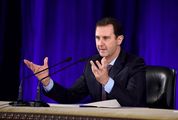



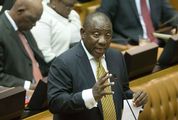

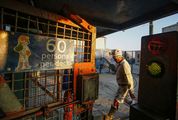











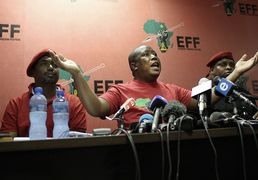




Change: 2.60%
Change: 2.92%
Change: 4.80%
Change: 2.21%
Change: 2.84%
Data supplied by Profile Data
Change: 0.00%
Change: 0.00%
Change: 2.60%
Change: 0.00%
Change: 0.00%
Data supplied by Profile Data
Change: -0.06%
Change: 0.00%
Change: 0.11%
Change: -0.07%
Change: 0.00%
Data supplied by Profile Data
Change: 0.00%
Change: 0.00%
Change: 0.00%
Change: 0.00%
Change: 0.00%
Data supplied by Profile Data